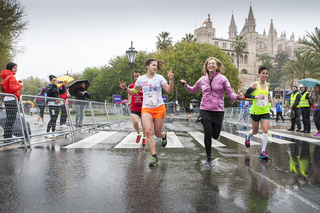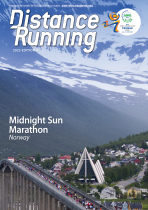Features
01 July 2014, 7am UTC
Fearless in Palma
261 Women’s Marathon
Sun 30 March 2014
In 1967 I was a 20-year old university student who loved to run. I showed my coach I could cope with the marathon distance and he got me into my dream race: Boston. I proudly pinned on my bib number, 261. The men in the race were full of encouragement for me.
Three kilometres into the race the press bus passed us. The race director spotted me, a woman, wearing a race number in his men-only race. He leapt off the bus, grabbed me, and tried to pull off my number and throw me out of the race.
Thanks to the help of the men around me I kept the number on and finished the marathon.
That event changed my life, and those of many other women, because it got me into creating a global series of 400 women’s races, including global championship marathons, in 27 countries. This Avon series of races led to the inclusion of the women’s marathon in the Olympic Games in 1984.
Now, in the US, women runners outnumber men. It has been a silent social revolution because women who embrace running empower themselves in every aspect of their lives. Yet most of the women in the world still suffer social, economic and religious restrictions. They have no hope because they have no opportunity to think otherwise.
But I recently became peppered with photos of messages from unrelated people all over the world who were wearing 261 on their back in races or inked on their arms. They said it made them feel fearless in the face of adversity. When I began receiving photos of 261 tattoos, I realized something serious was happening.
I found out what when an old AIMS colleague in Madrid, Jose Luis Carrera, called me, saying: “Women are running all over Europe but not in the marathon. In southern Europe they are particularly hesitant to enter a big race. We want to give them the chance to challenge themselves by staging a women’s marathon and we want to call it the 261 Women’s Marathon.”
Everyone, and especially women, have a story about being told they are not good enough, or that they don’t belong. That became the reason to have this 261 Women’s Marathon. To let women prove they can become fearless: if they can run a marathon they can do anything. In so doing they will reach out to other women, many of whom live in fearful situations.
In October last year we announced time and place: 30 March 2014 in Palma de Mallorca. Mallorca has become renowned as a training location and a holiday destination. We wanted to hold a 10km race and a marathon, but we had less than six months to get ready.
If you can run a marathon, you can do anything, and that includes securing political and community support, creating a website, finding sponsors, organising media contacts and staging media events, creating a course, getting AIMS certification, starting training groups, rounding up travel agents, pulling together an expo and speakers, building the timing and scoring systems, erecting scaffolding, tents, grandstands, providing toilets – all in three languages, and on an island. Every site visit required a flight.
Although the concept was to include and encourage women we decided from the outset not to exclude men. If men wanted to run with a wife or girlfriend, fine – we asked only that they respect the event as a chance for women to compete with those of their own ability and break the tape first.
Seven hundred women from 20 countries came to run. They came because they believed in the cause, and they found a community of belonging more powerful than they had imagined. The atmosphere was electric as women connected with their common language of running.
The start line was riotous. Women embraced, screamed and jumped up and down with perfect strangers, uniting in this global community. Among the few men was Martin Fiz, Spain’s marathon hero for having won both the ’95 World and ’94 European Championships. He was running with his wife Ana Maria Churruca in her first 10km event.
It never rains in Mallorca, but it did on race day. We loved it – the cooling rain and a pancake-flat course sped many runners to personal bests, including the winner, Beatriz Molina.
The finish was on a fuchsia carpet, and at the finish line, hugs, cameras, flowers and an Orquida Pearl necklace (from the place that invented them) awaited. Throughout the night women wearing 261 WM pearl necklaces shared their laughter, pride and fearlessness in bistros all over Palma.
These women and the 261 Women’s Marathon are leading the fast–growing “261” global movement for women. They are developing and sharing fearlessness though clubs, communication, special training and events. It’s not just about running, it’s about changing our lives, one step at a time, all over the world.
Result
marathon
Women
| 1 | Beatriz | MOLINA BAILEN | ESP | 2:57:29 |
| 2 | Jeannine | ISELI | ESP | 3:21:55 |
| 3 | Maite | ROJO | ESP | 3:25:18 |
| 4 | Elena | DAVI | ESP | 3:26:57 |
| 5 | Maria Amparo | MENENDEZ | ESP | 3:27:41 |
10km
Women
| 1 | Vanessa | VEIGA COMESANA | ESP | 37:10 |
| 2 | Beatriz | ANTILIN PEREZ | ESP | 38:06 |
| 3 | Maria | PUJOL PEREZ | ESP | 38:07 |






